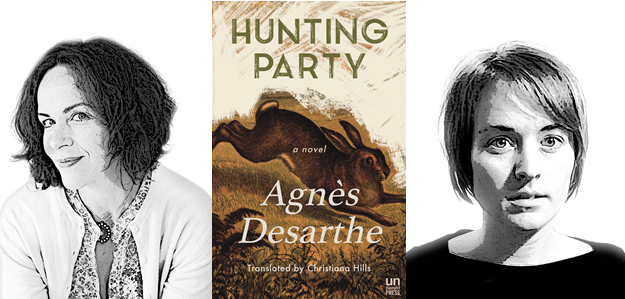

Translated from the French by Christiana Hills.
This is part of our special feature on Anxiety Culture.
This isn’t exactly how Tristan tells his story to Dumestre. He doesn’t tell him everything. He doesn’t use words like “stammer” or “arrogance.” He sticks to the facts, which he has to shout because of the wind carrying away his words, the thunder rumbling, the rain hammering down.
The two men have decided to defy the storm. Fresh streams of water slip under their collars; their legs are already soaked. Their feet are protected by shoes, their chests by the double thickness of a sweater and a jacket, but not for long. Soon, they’ll be swimming in the deceptive warmth of a thin layer of water circulating between their skin and clothing. Deceptive, because it’s ephemeral. The warmth won’t last. The nice slime will quickly become ice cold from the wind and their immobility.
This, thinks the rabbit, is a very serious problem. It’s your species’ main weakness. I don’t understand how you could have rid yourselves of your body hair. Was it out of vanity at first? Were you so anxious to distinguish yourselves from us that you agreed to give up your fleece? But maybe you didn’t choose. Maybe you’re undergoing a natural degeneration. You didn’t decide anything. Under your efficient exteriors, your domineering exteriors, you don’t decide anything. Someone is playing with you, someone is fooling you, but who? Who could be so cruel, so mischievous, so fiendish, as to deprive you of the best thermoregulation system there is?
Take the word for “fur” in French. Pelage. The word itself is soft. And for what reason do you think you can hear in it, like an echo, like its root, the French word peau, for skin? Precisely because hair is born in skin, planting itself there so tightly that water can’t get through, but not so much that air can’t get through. This way, our skin breathes without fear of getting wet.
It’s already starting to smell like carrion in your clothes—they’re not permeable enough to let your pores exhale, yet too permeable to prevent water from enveloping you. Your stench is astounding. Never smelled anything like it. If I were you, I’d dig a hole—yes, I know, whatever the situation, I’ll always propose a hole as the solution, but listen for a moment: you dig a hole and undress yourselves, then you shove your clothes into the hole so they stay dry. You run and you jump to warm yourselves up. Your skin breathes, you’re clean, and when the rain stops, you just have to dry yourselves in the sun, or the wind, or simply the air, and put your clothes back on. That way you’ll be warm. That way you’ll be covered up. Because, yes, I know it’s very important for you to be covered up. Just what is your problem with nudity, anyway?
Nudity, thinks Tristan. Nudity . . . But it’s not easy to think while speaking, while enduring the assaults of a storm. So words burst out one at a time, like on the surface of a volcanic mud pool: “nudity,” “shame,” “fear,” “sexuality.”
Oh yes, goes the rabbit. Sex. Sex is a very important thing for you humans.
It’s important for everyone, Tristan counterattacks. It’s important for animals, and especially for you rabbits. He almost starts laughing. A rabbit asking about sex, would you look at that.
We don’t call that sex, replies the rabbit, we talk about reproduction, and, personally, I regard those two notions as having nothing to do with each other.
You damn papist, says Tristan, outraged.
It takes one to know one, retorts the rabbit. Then just as quickly, he moves on: I heard this story, I can’t remember where, can’t remember when: “They knew that they were naked.” Everything started from there, after all, from your lack of fur. Take us, for example, we’re never naked. Let me start again. You exhibited your naked skin, and that, it seems, caused your kind lots of problems, problems with desire. You became obscene; you became indecent. You knew shame and lustfulness. That’s sex. Where I come from, there aren’t so many problems. We kept our fur; we have our hearts set on reproducing, by instinct, because you hunt us, because you—not just you humans, of course, but also foxes and other creatures, let’s be fair—you decimate us. We don’t have the choice, we don’t ask ourselves questions, we fuck to survive, that’s called perpetuating the species. But you, you live to fuck, that’s called sex. They’re two completely distinct activities, I assure you. I understand. It’s so complicated for you humans, whereas for animals, it’s functional. Certain fish are born female, then become male, because it’s practical, and for no other reason. And . . .
Tristan gently presses his thumb on the rabbit’s muzzle. He’s had enough. He wants to continue his story. He has to distract Dumestre. He tells the story because he’s endowed with speech, true speech, and intelligence as well, real intelligence. He speaks, rather than dancing naked in the rain, because he hasn’t spent millions of years evolving with persistence and tenacity in order to behave like an animal.
“And you didn’t find that strange, you and this teacher, all alone in his pad? Where’d this guy come from? I wouldn’t have trusted him. I mean, shit, school isn’t just for show, it’s more than just some perv showing warships to a defenseless kid.”
Dumestre didn’t appreciate the chapter about Hector. He thinks it’s shady.
“And that still doesn’t explain how your mother died either. Oh, shit, I feel the cold coming up my stomach.”
“And your feet?”
“Don’t talk to me about my feet, understand? Finish your fucking story and then we’ll see. I thought I heard a siren. Didn’t you hear a siren?”
“Yes,” Tristan admits, without adding that it was far away and had seemed to get even farther before disappearing in the ambient racket.
The light has suddenly grown so dim that it looks like dusk. But it’s the middle of the afternoon. Almost tea time. They won’t be drinking any tea, nor any of that marvelous coffee with the taste of scrap metal they’d enjoyed a few hours ago.
“Peretti could’ve left us his thermos, at least,” Dumestre grumbles.
“At this point, we would’ve been better off with Farnèse’s plonk,” answers Tristan in an awkward attempt at manly fraternization.
The mere act of uttering the word “plonk” makes Tristan uneasy. He would also rather refer to their alcoholic hunting companion by his first name, but he doesn’t know what it is. When people don’t call him Farnèse, they call him Titi. Titi for Thierry, probably. But if no one says Thierry, then . . . then . . .
“Don’t make fun of Farnèse,” says Dumestre after a moment. “He’s an unlucky guy. Before, he was sharp. He worked as a roofer. The love of a job well done, that’s what he had. Gotta have lots of balance in that job, lots of composure. They called Farnèse ‘the Tightrope Walker.’ He used to skip across rooftops, never wearing a harness, even for a church restoration that went up some fifty or sixty feet. Never wore a hard hat. Just a strange pair of diving fins, totally unorthodox. You know what I mean. No one in the trade wears anything like it. Those guys wear heavy boots. And him—that’s how you know he’s a character—he does it in rubber flippers. Speaking of which, this word, ‘unorthodox’—like something from Greek or Chinese—it’s his word. He’d say: ‘Might be unorthodox, but it works!’
“He had a thing with the school principal when he was still just a kid. The principal, would you believe it? Not a teacher. The principal herself, who was gorgeous. He must’ve been about eighteen. The principal wasn’t old, maybe in her thirties. Still, it was impossible love, you know? He was working as an apprentice with Lamalle, the roofer, but he had this taste for the finer things. Who knows where quirks like that come from? Like poppies at the edges of wheat fields. A seed must’ve been carried by the wind and planted in his head. For example, you put a musical instrument in his hands—any kind, right?—and he makes it sing for you. So of course, we call him ‘the Gypsy.’ Tightrope Walker at work, the Gypsy at the café.
“He used to love complicated words too, like ‘unorthodox.’ I don’t remember the other ones. The principal didn’t really give a damn about it, she knew more complicated words than he did. What she was looking for was adventure. She was a beautiful woman, but a sad one, and that’s a terrible thing. A sad woman, that’s something that shouldn’t exist. It’s the most dangerous thing for a man. Shit, my teeth are chattering. What’s the temperature you freeze to death?”
“I don’t know,” goes Tristan, dumbfounded. (He had gotten caught up in Farnèse’s romantic tragedy and forgotten the rain, the cold, the thunder.) “I don’t know,” he says again, “but I do know we’re going to get through this. I’m going to dig a hole.”
“We just got out of a fucking hole!” Dumestre growls.
“A different hole. Like a burrow. Really solid, one that won’t cave in on us. The temperature is consistent underground. With that, plus our body heat, we’ll surely be able to withstand this better. We can even spend the night in there if we have to.”
He gets to work immediately. Since the earth resists him, he cuts into the crust with the butt of his rifle.
“I hope that’s not loaded,” says Dumestre.
Tristan checks, takes out the cartridges, wipes the cold sweat running along his temples.
He almost put a bullet in his head.
He starts up again, with the butt of the rifle, with the barrel, his hands, his feet. He’s surprised he knows what to do, performing the motions with such precision. Surprised he’s not panicking, and even estimating the danger so precisely. He has realized that this isn’t an ordinary storm. What’s beating down on them, what’s about to come down hard on them, is something else. It’s what insurance policies designate a “natural disaster.” But the more adequate term would be “supernatural disaster,” because in a few hours, nothing will be recognizable anymore. The heights will have joined the depths, the depths will replace the heights. Tristan doesn’t have the least experience with an event like this, but it’s as if some disposition within him, dormant until now, has suddenly awoken, picked up the vibrations, the undulations, the rattling, the rolling, the slamming, the grating. The more his hands feel the earth, the more they’re learning about the nature of what’s going to sweep over them.
The skepticism that systematically keeps him from picturing the improbable doesn’t intervene. It’s not a question of plausibility, it’s certain: in a few hours, but maybe less—maybe it’s nothing but a few minutes—chaos will get the upper hand. Freed from who knows where, it will extend its monstrous hand, deft at kneading the earth with no regard for its inhabitants.
Emma.
Emma, alone in their house.
He forgot about her. He abandoned her. His wife. His wife who wants him to join the men, to fit in; his wife who sent him hunting. He agreed. She knew. Emma is like the ancient peoples. She has an innate sense of savagery.
He doesn’t understand why he’s suddenly so annoyed with her. As if she betrayed him, as if she sent him to his death. Yet she’s the one who’s in danger, in their poorly insulated house, with its pointed roof, flood prone, perhaps already flooded. Inside him, like outside, a storm is brewing. A voice that has long kept quiet rises up and growls. They’re not connected anymore, not united as two against the world; they’re trained on each other in opposing combat. Her will against his. Her idea against his. Their love has gone wrong. Their love has turned into a business deal, a millstone to grind away the days. Their consideration for each other suddenly disgusts him, this polite rubbing of shoulders, this reasonable effort so their business can function, so they can fit in, become like the others.
What is a female for, where you come from? asks the rabbit. Why don’t you have children?
Tristan refuses to hear this question, refuses to continue these crazy thoughts, these doubts inspired by fear. He must dig. He digs. Like a maniac. When he’s already waist-high in the earth, warmed up by the effort, he slips out of the burrow to give Dumestre his jacket.
Poking his head out of the hole, he catches sight of his companion, who, unaware he’s being observed, bends one knee, then the other, in order to reawaken his legs. Instead of rejoicing and congratulating Dumestre on the return of his mobility, Tristan crawls back underground and calls out to his comrade from the bottom of the burrow: “Do you want my jacket? I’m burning up down here.”
He pulls himself out for the second time and discovers Dumestre, his legs out and motionless, propped up on his elbows to get closer.
“Looks like your arms are better,” risks Tristan. “And your legs, still nothing?”
“You want me to draw you a picture or what? I have a broken spinal column, isn’t that clear? You think the Holy Spirit’s just going to bless me with some miracle?”
“Sorry,” says Tristan.
He clambers over to Dumestre and drapes his jacket over his companion’s large chest.
“Your coat’s soaked,” grumbles the cripple.
“It’ll still protect you a little,” says Tristan, tucking in Dumestre’s immobile body as best he can. Then he takes off his sweater and puts it around the thick neck like a scarf. “I’m making headway. Don’t worry.”
His hands are trembling. Is it because of fatigue, hunger, thirst? Is it because of fear? He isn’t equipped to deal with dishonesty, never has been. Like something vital is missing.
Agnès Desarthe is the author of nine novels for adults in her native French, many of which have been translated to critical acclaim, most notably Chez Moi, The Foundling, and Five Photos of My Wife, which was shortlisted for the Independent Foreign Fiction Prize and the Jewish Quarterly Fiction Prize. Her books have been featured in The Guardian, Publishers Weekly, The Telegraph, The Independent, Kirkus Reviews, and many other places. She is also the translator for several authors, including Cynthia Ozick, Jay McInerney, and Virginia Woolf. She lives in France.
This excerpt is published by permission of Unnamed Press.




